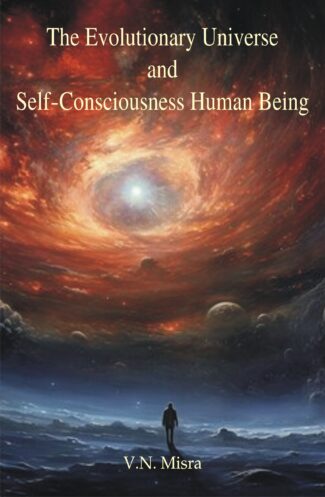Showing 13–14 of 14 results

The book elucidates scientifically and philosophically the evolutionary universe (brahmāṇḍa) and the self-conscious human being (piṇḍa). This universe came into form about 14-13.7 billion years ago and has undergone perpetual changes including life on earth some 3.9 billion years ago. Man’s self-conscious evolution is driven by his intellectual growth and philosophical wisdom.
The book elucidates scientifically and philosophically the beginning of the evolutionary universe (brahmāṇḍa) and the intellectual growth of self-conscious human being (piṇḍa), the former is “out” there and the latter is “out” here. Without the latter, the former is difficult to be perceived or known. Going by the scientific cosmology, this universe came into form about 14-13.7 billion years ago as a result of Big Bang, and has undergone perpetual changes including life on earth some 3.9 billion years ago. Man’s self-conscious evolution is driven by his intellectual growth and philosophical wisdom. It has been studied both from the Indian and Western philosophic perspectives.
The philosophical wisdom in this regard is in sync with many modern scientific concepts. The Sāṁkhya–Yoga philosophy is embodied with the concepts of sattva, rajas and tamas. These three are in a sense comparable to the proton, the electron and the neutron of modern science. The proton provides the coalescence or the form of the atom; the electron gives us energy and proton provides the mass. Some other Indian philosophical systems like Vaiśeṣika, Advaita Vedānta and Bauddha are replete with similar scientific approaches. So also are the studies of Western philosophers like Immanuel Kant, David Hume, Niels Bohr and David Bohm. All the things are happening within the time and space.
This volume explains the mysteries of Creation from the Vedic standpoint by an eminent scholar Pandit Motilal Shastri, a devout disciple of the much acclaimed Vedic guru, Paṇḍit Madhusūdan Ojhā. It consists of five scholarly discourses presented before an august audience of well-known scholars and ācāryas of Vedaśāstra, at Rashtrapati Bhawan during 14-18 December 1956. These discourses – Science of Agni-soma; the Science of Five Divisional Universe; Vedic Concept of Man: An Exposition; Science of Aśvattha: An Outline; and Integrated Relationship of Vedaśāstra and Purāṇaśāstra – illuminate new insights into the mysteries of Creation, offering new definitions to well-known Vedic terms. The volume in hand is an English translation of these five discourses by Rishi Kumar Mishra, a well-known author, writer and editor, and a disciple of Pandit Motilal Shastri. It enables the new generation of scholars and intellectuals to understand and grasp the mysteries of Creation. It is an inimitable storehouse of Vedic wisdom.
| There are no products |